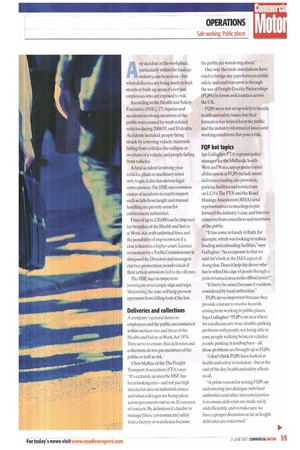fly accident in the workplace, particularly within the haulage industry,
Page 59

If you've noticed an error in this article please click here to report it so we can fix it.
can be serious—but when deliveries are being made to high streets or built-up areas,it's not just employees who are exposed to risk.
According to the Health and Safety Executive (HSE), 171 injuries and accidents involving members of the public were caused by work-related vehicles during 2004/05, and 10 deaths. Accidents included: people being struck by a moving vehicle; materials falling from vehicles; the collapse or overturn of a vehicle; and people falling from vehicles.
A fatal accident involving your vehicles, plant or machinery is not only tragic, it also has serious legal consequences.The HSE says common causes of accidents in road transport such as falls from height and manual handling are priority areas for enforcement authorities.
Fines of up to £20,000 can he imposed for breaches of the Health and Safety at Work Act, with unlimited fines and the possibility of imprisonment if a case is heard in a higher court. Licence revocation by a Traffic Commissioner is also possible. Directors and managers can face prosecution as individuals if their acts or omissions led to the offence.
The HSE says its inspectors investigate even simple slips and trips. Minimising the risks will help prevent operators from falling foul of the law.
Deliveries and collections
A company's general duties to employees and the public are contained within sections two and three of the Health and Safety at Work Act 1974. They serve to ensure that deliveries and collections do not put members of the public or staff at risk.
Chris McRae of the The Freight Transport Association (PTA) says: "It's certainly an area the HSE has been looking into — and not just high streets, but also on industrial estates and when roll cages are being taken across pavements and so on. It's an area of concern. By definition it's harder to manage [these environments] safely than a factory or warehouse because the public are wandering about."
One way the trade associations have tried to bridge any gaps between public safety and road transport is through the use of Freight Quality Partnerships (FQPs) in towns and counties across the UK.
FQPs were not set up solely to handle health and safety issues, but their formation has helped keep the public and the industry informed of issues and working conditions that pose a risk.
FQP hot topics
Ian Gallagher,FTA regional policy manager for the Midlands, SouthWest andWal es, says popular topics of discussion at FQPs include street deliveries, loading, site provision, parking facilities and restrictions on LOVs.The PTA and the Road Haulage Association (RFIA) send representatives to meetings to put forward the industry's case, and listen to concerns from councillors and members of the public.
"It has come in handy in Bath, for example, which was looking to reduce loading and unloading facilities," says Gallagher. "As a response to that we said: let's look at the H&S aspect of doing that. Does it help the driver who has to wheel his cage of goods through a pedestrianised area to his offload point?'
"It has to be raised because it's seldom considered by local authorities."
FQPs are so important because they provide a forum to resolve hazards arising from working in public places. Says Gallagher:"FQP is an area where we can discuss any issue: double-parking problems with people not being able to pass; people walking between vehicles; people parking in loading bays — all those problems are brought up at FQPs.
"I don't think FQPs have looked at health and safety in isolation — but at the end of the day, health and safety affects us all.
"A prime reason for setting FQPs up and entering into dialogue with local authorities and other interested parties is to ensure deliveries are made safely and efficiently, and to make sure we have a proper discussion as far as freight deliveries are concerned."
























































































































































































































